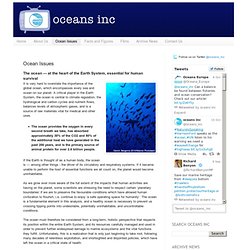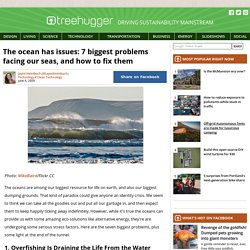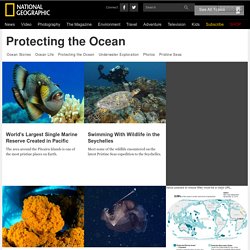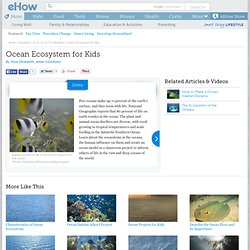

Oceans inc: Ocean Issues. The ocean — at the heart of the Earth System, essential for human survival It is very hard to overstate the importance of the global ocean, which encompasses every sea and ocean on our planet.

A critical player in the Earth System, the ocean is central to climate regulation, the hydrological and carbon cycles and nutrient flows, balances levels of atmospheric gases, and is a source of raw materials vital for medical and other uses.The ocean provides the oxygen in every second breath we take, has absorbed approximately 30% of the CO2 and 80% of the additional heat we have generated in the past 200 years, and is the primary source of animal protein for over 2.6 billion people. If the Earth is thought of as a human body, the ocean is — among other things - the driver of its circulatory and respiratory systems. If it became unable to perform the host of essential functions we all count on, the planet would become uninhabitable. The Value of the Ocean: what do we stand to lose? Threats to oceans and coasts. The Ocean Has Issues: 7 Biggest Problems Facing Our Seas, and How to Fix Them.
Photo: MikeBaird/Flickr CC The oceans are among our biggest resource for life on earth, and also our biggest dumping grounds.

That kind of paradox could give anyone an identity crisis. We seem to think we can take all the goodies out and put all our garbage in, and then expect them to keep happily ticking away indefinitely. However, while it's true the oceans can provide us with some amazing eco-solutions like alternative energy, they're are undergoing some serious stress factors.
Here are the seven biggest problems, plus some light at the end of the tunnel. 1. Overfishing is having some serious impacts on our oceans. There is much to be desired in the ways we fish. Reasons for overfishing are obvious in some ways, in that there are a lot of people who like to eat a lot of fish. Knowledge of what seafood can be sustainably eaten, whether that is the species of seafood or the method by which it is caught, is a must in order to help keep the ocean's fisheries healthy. 2. Photo: jurvetson. Protecting the Ocean. World’s Largest Single Marine Reserve Created in Pacific The area around the Pitcairn Islands is one of the most pristine places on Earth.

Swimming With Wildlife in the Seychelles Meet some of the wildlife enountered on the latest Pristine Seas expedition to the Seychelles. Value passed to resize filter must be a valid URL. Gabon Unveils Huge Marine Reserve The protected area will cover 18,000 square miles of ocean—home to great hammerhead sharks, manta rays, whale sharks, and tiger sharks. Watch: Rare Sea Devil Fish Caught Made famous in the movie Finding Nemo, a sea devil is caught on film for the first time. Mapping the World's (Few) Protected Seas Gabon and the U.S. have new marine reserves, but just a fraction of the seas are protected. The Antarctic's New Way to Melt Ice shelves lose more mass through melting where the ice meets the sea than by shedding icebergs, a new study says. Ocean Ecosystem for Kids. Ocean ecosystems consist of fish, plants and animals that contribute to the life cycle.

Ninety percent of life in the ocean occurs on the continental shelves, where the waters are not as deep and sunlight can reach to provide light or warmth. According to the Museum of Science, the most abundant plants in the ocean are phytoplankton. These single-celled, microscopic floating plants provide food for fish and animals in the oceans. Many varieties of fish and shellfish reside in the oceans, providing food for other creatures, including humans.
The ocean is also home to unusual creatures, including sea rays and sea stars.